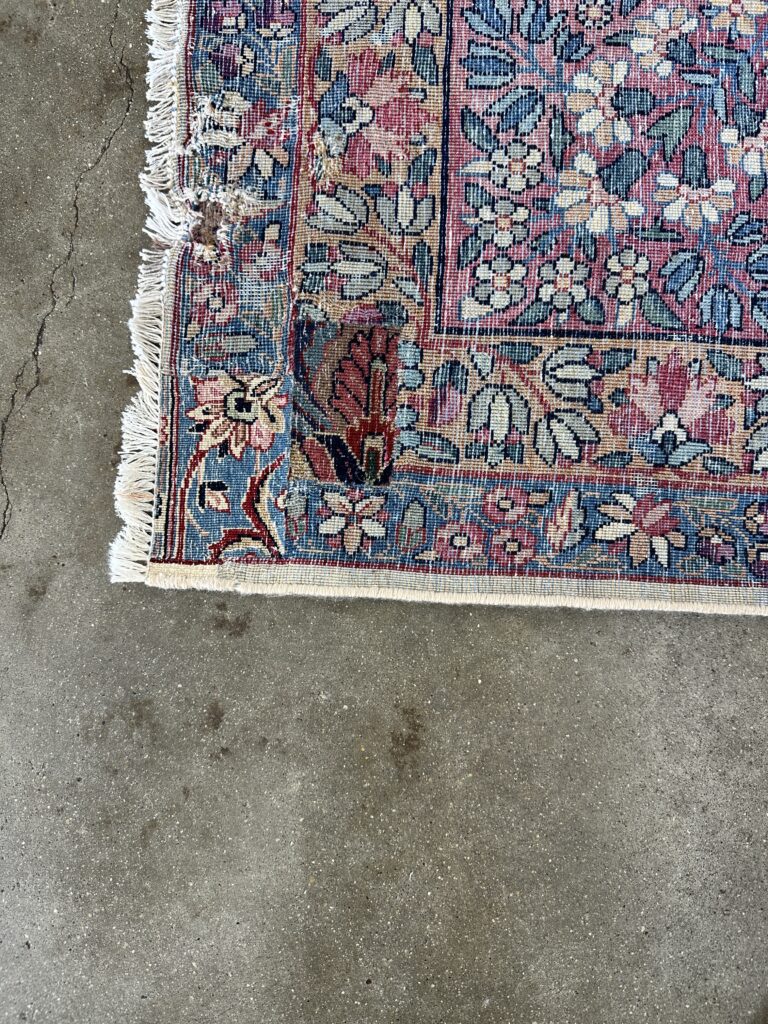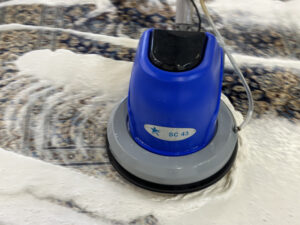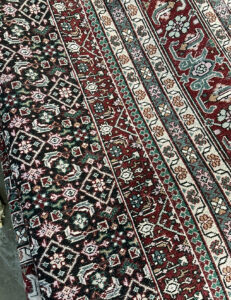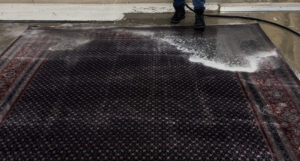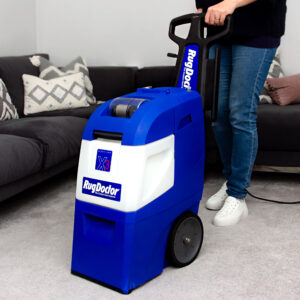Reweaving vs Patching Rugs – Which Option Is Best? | Ahmadi Rug Chicago
A hole in your rug doesn’t always mean the end. But the decision you make next can make or break its value, appearance, and lifespan.
Understanding the differences between reweaving vs patching rugs is essential for making the right choice.
In this article, we will delve deeper into the topic of reweaving vs patching rugs to help you make an informed decision.
At Ahmadi Rug, we help Chicago homeowners and collectors choose between reweaving and patching — the two most common repair options for serious rug damage.
Here’s what each method means, when to use it, and how we help you decide the best route.
What Is Rug Reweaving?
Reweaving is the gold-standard repair method used to:
- Rebuild missing or destroyed areas of a rug
- Match original knots, dyes, and fiber direction
- Preserve the rug’s integrity, structure, and pattern
- Maintain or increase the rug’s resale or appraisal value
Reweaving is done knot by knot, often under magnification, using silk, wool, or cotton to match the original weave.
It is ideal for:
- Persian and Oriental rugs
- Hand-knotted antiques
- Collector or museum-quality pieces
- Rugs with central or border pattern damage
Reweaving is time-consuming and expensive — but it’s invisible when done properly.
What Is Patching?
Patching involves inserting or sewing a matching section of rug into the damaged area.
This can be done using:
- Material salvaged from the same rug
- Donor rugs with similar weave and color
- Machine stitching or hand attachment
- Edge blending and tension adjustment
Key Considerations in Reweaving vs Patching Rugs
Patching is faster and more cost-effective, but may show slight visual differences depending on rug type.
It is ideal for:
- Machine-made or modern rugs
- Rugs with hidden or corner damage
- Low sentimental or resale value
- Quick-turn cosmetic fixes
Patching does not preserve knot count or structural authenticity.
Visual Difference: Reweaving vs Patching
| Factor | Reweaving | Patching |
|---|---|---|
| Authenticity | ✅ Maintains full structure | ⚠️ Surface-level repair only |
| Cost | $$$ – High | $$ – Moderate |
| Time | 2–6 weeks | 3–10 days |
| Appearance | Seamless (invisible) | Slightly visible |
| Use Case | High-end rugs, central pattern damage | Corners, hidden areas, less valuable rugs |
How We Help You Decide at Ahmadi Rug
Our expert restorers assess:
- Knot density & fiber integrity
- Size and location of the damage
- Color fastness and fading
- Age, provenance, and value of the rug
- Your long-term use and storage plan
We’ll then recommend:
- Reweaving if preservation and resale value are priorities
- Patching if you want a quick, clean, and budget-friendly solution
In some cases, we combine both methods — patching first, then reweaving edges to blend the repair perfectly.
Case Study: Reweaving vs Patch
Rug: 7×10 Persian Kashan
Damage: Dog chewed corner + torn central medallion
Client’s Goal: Keep rug in family living room (not resale)
Our Recommendation:
- Patch corner with donor rug
- Reweave medallion with 220 knot-per-inch wool + silk
Result: 98% invisible finish. Faster turnaround. $700 saved vs full reweaving.
Serving Chicago & North Shore
We specialize in:
- Oriental & Persian rug reweaving
- Silk + wool patch blending
- Collector-level restoration
- Custom estimates per rug
📞 Request Your Free Evaluation Today →
Internal Links
Rug Repair Chicago
Frayed Rug Edge Repair
Pet-Damaged Rug Repair
Proudly Serving all Chicagoland area and all North Shore area
FAQ
Can you patch a rug without anyone noticing?
Sometimes. For modern rugs or small areas, patches can blend very well. But for handmade Persian rugs, reweaving is often better for invisibility.
Is reweaving always worth it?
It depends on the rug’s value, age, and location of damage. We’ll guide you honestly — not every rug needs a full reweave.
How much does reweaving cost in Chicago?
Reweaving can range from $300 to $1500+, depending on rug size, fiber type, and damage. Patching is often half the cost.
